Winter is approaching, so now is the perfect time to conduct fall plumbing maintenance to prepare your home for the colder months. Winterizing your house doesn't have to be complicated. Follow these fall plumbing and maintenance tips to winterize your home and enjoy a cozy winter.
Fall Maintenance to Prepare Indoors for Winter
1. Include boiler inspections in your fall maintenance routine
Fall is a great time to conduct your annual boiler inspection and prepare plumbing for winter. By performing regular fall maintenance, you can proactively detect and repair leaks and defects and prepare your water pipes for colder weather. Homeowners can introduce chemical system cleaners that clean and condition steam hydronic heating systems and seal leaks by settling into crevices. These chemical cleaners help maximize energy efficiencies and can extend the life of your system.
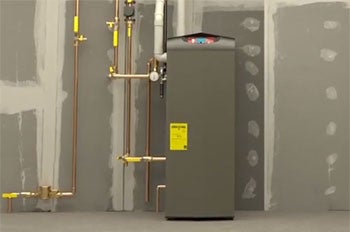
 Testing the system’s product concentration and inhibitor levels prevents buildup. Homeowners can use Hercules Cryo-Tek Test Strips to check propylene glycol and corrosion-protection levels.
Testing the system’s product concentration and inhibitor levels prevents buildup. Homeowners can use Hercules Cryo-Tek Test Strips to check propylene glycol and corrosion-protection levels.
If the pH in the system is incorrect after the test, add chemicals to balance the concentrations of the product. For example, add an approved Corrosion Inhibitor if the pH is below 8.5. Chemical system cleaners can reduce scale buildup, lubricate pump seals, and free zone valves
2. Descale your tankless water heater
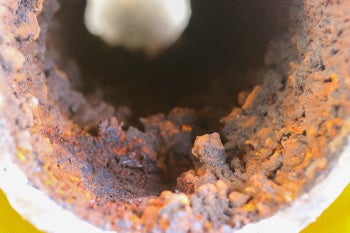
As previously mentioned, scale can build up in the plumbing, leading to blockages. While conducting fall plumbing maintenance, homeowners should introduce an annual descaling kit. Descaling kits are a great option for DIY-ers and includes everything needed to dissolve any inorganic deposits easily. Before performing plumbing maintenance on a water heater, we recommend reviewing the manufacturer’s guidelines
3. Introduce Anti-freeze in closed loop systems
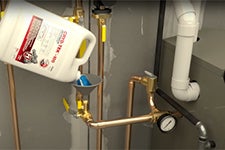 While checking corrosion protection levels, ensure freeze-protection levels are also adequate. During cold weather, prolonged periods without power can lead to freezing or bursting plumbing. Checking antifreeze levels during the fall maintenance routine can protect closed-loop water systems during winter.
While checking corrosion protection levels, ensure freeze-protection levels are also adequate. During cold weather, prolonged periods without power can lead to freezing or bursting plumbing. Checking antifreeze levels during the fall maintenance routine can protect closed-loop water systems during winter.
When adding antifreeze to any plumbing, check the temperature range needed and use the recommended concentration from the manufacturer
4. Annual HVAC maintenance
While some homes utilize hydronic heating, those using forced-air systems should include HVAC inspections in their fall maintenance routines. Check your home’s HVAC system during a visual inspection for dirt or buildup, especially in the registers and grilles. If filters appear dirty, use this time to replace them.
Regular filter replacement is crucial to maintaining system efficiency and improving air quality in a home. Leaving filters in too long makes heating systems use more energy to push air out because of buildup. Filters should be replaced every three months, but also check the filter manufacturer’s recommendations
Fall Maintenance Tips to Winterize the Outdoors
5. Prepare outdoor plumbing.
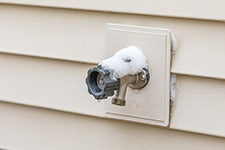 Trapped water can lead to leaking or bursting pipes during winter. Homeowners should locate and manually turn off outdoor spigots/hose bibs during the fall plumbing maintenance routine. Water trapped in outdoor plumbing during the winter can freeze and expand, leading to cracks. Once the system is turned back on, these cracks may cause leaks.
Trapped water can lead to leaking or bursting pipes during winter. Homeowners should locate and manually turn off outdoor spigots/hose bibs during the fall plumbing maintenance routine. Water trapped in outdoor plumbing during the winter can freeze and expand, leading to cracks. Once the system is turned back on, these cracks may cause leaks.
While temperatures are still above freezing, remove and store your hose and drain any remaining water. If you have a valve for your outside faucets, close it and drain the remaining water. Once drained, turn off the outdoor faucet and insulate.
Adding insulation or a louvered vent will ensure warm air can reach these areas to prevent freezing. In the fall, check unheated areas of your house with plumbing, garages, and crawl spaces for exposed pipes. Once located, add insulation to prevent them from freezing when temperatures drop.
6. Winterize irrigation systems.
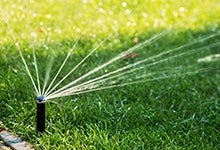 The end of fall is a perfect time to prepare irrigation systems for winter. You must clear and drain these lines to winterize your home’s irrigation systems properly. There are three main ways to drain an irrigation system: manual drainage, automatic drainage, and blow-out drainage. The blow-out method uses an air compressor to remove water from the system.
The end of fall is a perfect time to prepare irrigation systems for winter. You must clear and drain these lines to winterize your home’s irrigation systems properly. There are three main ways to drain an irrigation system: manual drainage, automatic drainage, and blow-out drainage. The blow-out method uses an air compressor to remove water from the system.
7. Check your rain collection system.
Preparing your home for winter involves more than protecting it from freezing temperatures. Heavy winter storms can bring large amounts of precipitation, making your rain collection systems vulnerable. Blocked drains and gutters can cause water to overflow down the house into the foundation or basement.
Conduct preliminary inspections to locate and repair leaks and clean gutters, paying particular attention to the vertical components. Dirty gutters can lead to clogs, causing the system to run inefficiently.
To clean gutters, remove big debris by hand and use a gutter scoop to eliminate compacted trash. Once cleaned, flush gutters with water to check for clogs. Subsequently, drains should be checked for proper flow and drainage, paying specific attention to any leaks at the seams. Visit our case study library for plumbing resources, tutorials, and guides